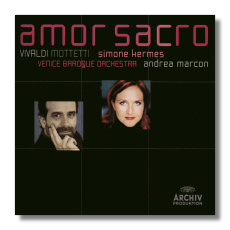
The Internet's Premier Classical Music Source
Related Links
- Vivaldi Reviews
- Latest Reviews
- More Reviews
-
By Composer
-
Collections
DVD & Blu-ray
Books
Concert Reviews
Articles/Interviews
Software
Audio
Search Amazon
Recommended Links
Site News
 CD Review
CD Review
Antonio Vivaldi

Amor Sacro
- In furore iustissimae irae, RV 626
- Nulla in mundo pax sincera, RV 630
- In turbato mare irato, RV 627
- Sum in medio tempestatum, RV 632
Simone Kermes, soprano
Venice Baroque Orchestra/Andrea Marcon
Archiv 477598-0
"Motet" in Vivaldi's time was used more precisely than latterly – to denote extra- or non-liturgical items composed on a wider variety of texts than the liturgy envisaged and played amid the strictly liturgical items. Some motets were substituted for antiphons and sung at moments when the service was at a hiatus or pause, such as the Elevation of the Host – as if to underline or emphasize a climacteric. Motets were frequent for both special days in the year, the church's saint's feast day, for example; and at any appropriate time. By the beginning of the eighteenth century solo motets had become popular and were an accepted way of blending the dignified Latin in which the texts were constructed with the often quite florid, usually idyllic, tenor of contemporary secular and vernacular poetry.
Vivaldi invariably used the commonly accepted formula of an ABa da capo aria followed by a short recitative, a second da capo aria in a contrasting key and concluding with an allegro "Alleluia'. This is what we have – four of them – on this nice little CD from Simone Kermes and the Venice Baroque Orchestra conducted by Andrea Marcon.
"Formula" is almost the word. These performances, at least, put neither the fear of God nor the inspiration of the Devil into anyone. And those are things Vivaldi can do when the need is present. But the music performed here is none the worse for a little understatement. It's believed that Vivaldi began to write such motets in the mid 1710s, when he was thrust into the role of choirmaster at the Ospedale della Pietà in Venice after the official incumbent fled to Rome. But these are works from later in his career and, while varied and competent, musically very pleasing and melodious, they tend to lack that opulent flare of the most raging and at the same time subtle Vivaldi. That said, the singing of Kermes makes the most of them. Her voice in the second aria, "Resplende, bella" (the longest piece on this disc at 7¾ minutes) of In turbato mare irato is nothing short of ravishing; the way she negotiates the following "Alleluia" spectacular, if a little breathy.
The motets are, nevertheless, dramatic and never fatigue. The faster outer movements of Sum in medio tempestatum share a luscious dramatic quality with the world of opera in which, of course, Vivaldi was immersed in the 1730s. The metaphor is the troubled soul in stormy waters longing for calm and peace. Again Kermes approaches these with enthusiasm, although her tuneful and pure as pure singing (with plenty of variety in dynamic) sometimes seems hurried as though her motivation is more work than devotion. Emotion is very much the driving force of this and In turbato mare irato more fervor and engagement would have been welcome. Not that her articulation can be faulted. At the words "suspirando, lacrimando" (sighing, crying) a little more acknowledgment – not so much that this soprano had better cry – as that these are universal reactions would have been welcome. Although there is not the compulsion to pay as much homage to the architecture of the motets as one would in Vivaldi's operas, there is a lingering feeling that, however good the attack and sustaining of each aria and recitative, Kermes in particular isn't fully thinking of the work as a whole as these movements proceed.
An accomplished singer, this is Kermes" first solo disc; it's not that her approach is raw, perhaps too cautious rather. She has the power to amaze – that's clear both from the other recordings to her credit and the beauty of her singing here. Just that we would welcome more dash, just a touch more panache from her. The playing of the Venice Baroque is jaunty, though perhaps not jaunty enough, joyful, though perhaps not joyful enough. They tend to follow rather than accompany Kermes. Nevertheless, neither is ever lagging, nor, one feels, out of touch and sympathy with the music: such is evident from the way the final "alleluia', which comes to something of an abrupt end, is performed. One is not left dissatisfied.
The music is simple if not magnificent; paced, if not headstrong; and tuneful if not transporting. The performances match. The recording may also lack just a millisecond or two of reverberation. At just under 67 minutes, this isn't the most generous of CDs. The booklet is informative and contains useful background information on the origins of the motets" composition. All in all, this is a useful and unpretentious CD. There are alternatives – Ciofi with Europa Galante and Biondi (Virgin Classics Veritas 45704) would be a good first choice for In furore and In turbato mare and The King/King's Consort Sacred Music - Volume 8 (Hyperion CDA66829) for Sum in medio tempestatum with Tuva Semmingsen, a mezzo; Mallon and the Aradia Baroque Ensemble (Naxos 8.557445) could be first choice for Nulla in mundo with Jane Archibald. But the present CD is a good and pleasing coupling; they're compelling if unambitious motets and Kermes, Marcon and The Venice Baroque Orchestra do them justice.
Copyright © 2007, Mark Sealey




















